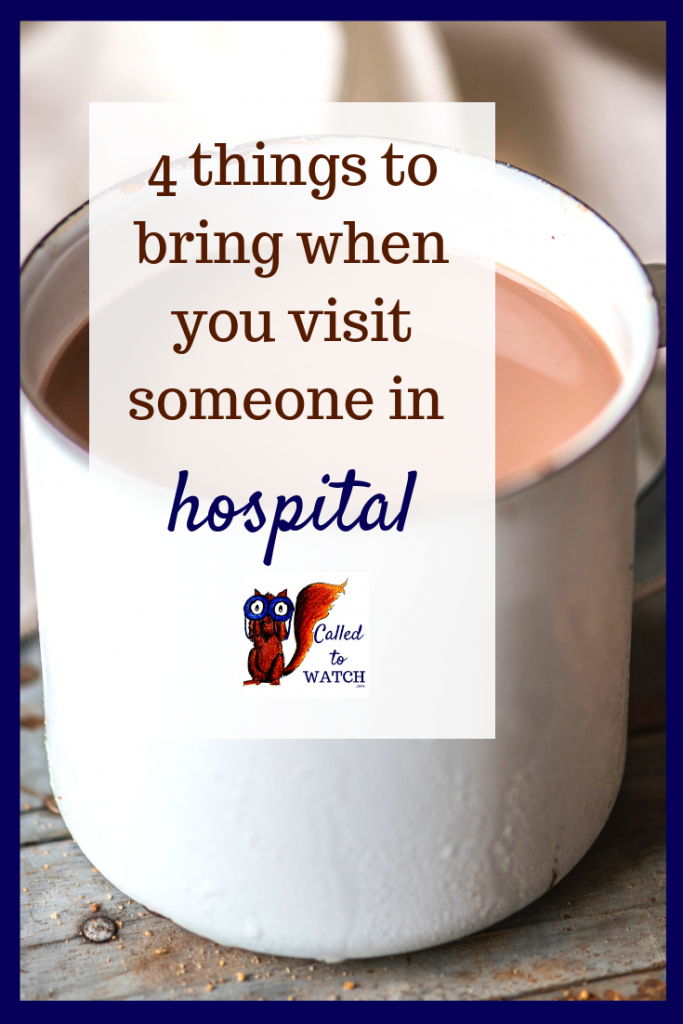In fact, for many of us, visiting someone in hospital might be a novel, somewhat unsettling experience. Perhaps we have bad memories of other hospital visits, or perhaps we’ve never been to one before.
For others of us, a hospital visit might seem easy and we don’t understand why we can’t just pop in at any time with whoever we like.
While neither perspective is ‘wrong’ (and I have held both at different times) they can both miss the point.
Visiting someone in hospital is not about us, how easy or difficult it is, or how it makes us feel.
Visiting someone is about loving them.
How to make a hospital visit less awkward: ie. not centred around ourselves!
The Number One rule: Check they want visitors.
Not everyone does. Not everyone wants them every day, and that’s fine.
“Someone said that they spoke to Sally who said that she was sure it is fine to visit on Wednesday” is not confirmation enough. Speak to the sick person or a close family member. A text message will do.
This is the first way you can love.
Communicate expectations
Once we know they want visitors it can be easy to feel we can drop in at any time, particularly if you’re not the plan-ahead sort.
Yet if we want to make the visit about them and not us, we will make sure it is best suited to them. There’s a difference between a ‘visit’ and a ‘brilliant visit’ and sometimes it’s in the communication.
Now all situations are different. Sometimes you may be able to speak to the patient directly, other times you may need to contact a proxy. A lot of communication is best done before the visit, but there are questions you may need to ask on the day as well.
Questions to ask beforehand:
When’s the best time to come?
Who can I bring with me? How many people are too many? Can I bring my children? (this last question needs to be phrased sensitively. After all, it is a difficult one to answer with a negative, but children and hospitals don’t always get along)
How long can I stay?
What can I bring?
Questions to ask the family:
Is there anything I need to be aware of?
I’m planning to go at this time, does that work for you? (maybe they can take a break while you’re there etc.)
Is there anything the sick person is enjoying/makes them happy that I can bring?
Questions to ask on the day:
Is today a good day? I was planning on staying until X time, but I can leave earlier or later, what works best for you?
Please tell me if you’re getting tired-er. sick-er than you expected. You won’t hurt my feelings and I’m happy to leave.
This visit is about you – so please let me know if I’m being too loud, or you want me to fetch you something etc.
Be aware that situations change. Health and tolerance can differ minute by minute. Remember that you’re not aiming for ‘the perfect visit,’ your’re aiming to love.


How to keep the conversation going
It can be difficult to keep up conversation during a hospital visit. Normally verbose people can find themselves searching frantically for topics of conversation. This can be because:
- it’s an unfamiliar environment
- it’s not very private
- you’re not ‘doing’ anything
- you may feel you need to avoid sensitive topics
- your Loved One might not have ‘done’ anything so might not have much to share
Talk about yourself – share the world
Often someone in hospital is interested in what’s happening in your life and the wider world. It can be grounding, and bring them a feeling of normality. Funny stories and strange situations can bring laughter to a hospital room.
By all means talk about yourself, but let’s remember to be sensitive. Complaining incessantly about small annoyances or your own health is not kind. Comparing their plight to your own, or someone else you know can be unhelpful.
Ask about them: do not assume
It’s so easy to think that you need to ‘take their mind off it’ and talk valiantly about other topics – but let’s not simply assume this is true.
It can be hurtful if you don’t ask about their health and listen to their response. Don’t be afraid to ask questions (within reason). If they want to talk about it they will, and if not they will change the topic. Let them make the decision.
Their health at the moment is their life, so do not be afraid to enter in.

What to bring on a hospital visit
Yourself
You don’t need to bring anything and no one (in my opinion) expects you to. Particularly if you’ve visited before, or are in a situation where you can’t bring something (coming from work, financial etc.).
Bring normal things
By normal, I mean, things they use at home which they may not have in hospital.
In fact, it’s surprising all the things hospitals don’t have. Fresh fruit and vegetables, slippers, good tea bags, an eye mask to keep out the light, warm socks, moisturiser, a non-plastic mug, a newspaper, a pencil case, a drink bottle.
None of these things have to be new or expensive. Sometimes the best present is dropping by their home to pick up their old slippers, or a picture of their pet.
Bring special things
Special, unnecessary things can often make us feel special ourselves. By this I mean flowers, a cute toy, a new book, a soft pillow, chocolate, a silly figurine.
That said: hospital rooms are small, the shelves are tiny. There’s only so many flowers one can have, and it’s entirely possible to have too much chocolate or too many stuffed toys. If in doubt, talk to someone else who’s visited or a family member.
Bring hopeful things
When someone’s been in hospital for a while, it’s easy to forget that things will change. They may not get better, but their current hum-drum hospital existence won’t last forever. Whether it’s discharge or heaven (or both!) there’s a future in store for your Loved One, whether they are aware of it or not.
Words can be a means of hope. So bring them. Cards, offers of prayers, plans for the future, plans to help out, Bible passages, songs, quotes, hugs, tears or smiles.
Perhaps they don’t have the concentration to listen, perhaps they don’t share your faith, perhaps they are in a coma – there are so many situations, but perhaps even in the most hopeless we can do one of these:
- Ask how we can help them to hope.
- Share our own hope
- Pray with them, or over them, or for them.
- Love their family and support their support network
A final tip for awkward hospital visits
Don’t expect your visit to be perfect. Don’t think you being there will cheer them up or solve all their problems or take their pain away.
Be realistic. This is an opportunity to love. It’s not about you. It doesn’t matter if you leave the hospital with warm fuzzy self-congratulatory feelings or as a teary, anxious wreck. What matters is you did your best to love someone else.
Some visits will leave you unsure. Some visits you will choose the easy way over the right way, and some visits will be more about you than your Loved One.
That’s okay. We’re human. We fail – but God uses all situations none the less.
//do you find visiting hospitals awkward? Have any of these thoughts resonated with you? Which ones?
PS: Enjoyed the post above? Get the next one delivered straight to you! Sign up for email notifications
I’m also on Facebook, Pinterest, Instagram & Twitter! Meet me there for more interesting reads, resources and community.

